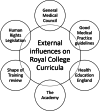Inclusion of person-centred care in UK postgraduate medical education curricula: Interviews and documentary analysis
- PMID: 37821866
- PMCID: PMC10568751
- DOI: 10.1186/s12909-023-04730-2
Inclusion of person-centred care in UK postgraduate medical education curricula: Interviews and documentary analysis
Abstract
Background: Person-centred care (PCC) involves placing people at the centre of their healthcare decision making to ensure it meets their needs, values, and personal circumstances. Increasingly, PCC is promoted in healthcare policy and guidance, but little is known about how this is embedded in postgraduate medical training. The aim of this research was to understand how PCC is embedded in UK postgraduate medical training and explore factors influencing inclusion of PCC in curricula content.
Methods: To explore this, we interviewed senior professionals with key roles in the curricula from four UK Royal Colleges (Psychiatrists; Physicians; Surgeons; and GPs) and used framework analysis on interviews and relevant curricula documents to identify themes.
Results: Legislation and professional/educational guidance influenced inclusion. PCC definitions and terminology differed and placement within curricula was variable. Royal Colleges defined the curriculum and provided training to ensure competence, but local deaneries independently implemented the curriculum. Trainer engagement was greater than trainee buy in. Quality assurance focused on feedback from trainers and trainees rather than patients, and patient and public involvement in curriculum development, teaching, and assessment was limited.
Conclusions: There is a need for cross-organisation collaboration to develop a PCC competence framework that defines the skills and level of competence required at different points in training, with clarity around the differences between undergraduate and postgraduate requirements. Greater auditing and quality assurance of programme delivery would help identify successful practices to share within and across Royal Colleges, while still maintaining the flexibility of local provision. Engagement with patients and the public in this work can only strengthen provision.
Keywords: Curriculum; Medical; Person-centred care; Postgraduate education.
© 2023. BioMed Central Ltd., part of Springer Nature.
Conflict of interest statement
The authors declare that they have no competing interests.
Figures



References
-
- Health Innovation Network South London. What is person centered care and why is it important? 2016 [Available from: https://healthinnovationnetwork.com/system/ckeditor_assets/attachments/4....
-
- National Voices. Person centered care 2020: Calls and contributions from health and social care charities 2015 [Available from: https://www.nationalvoices.org.uk/sites/default/files/public/publication....
-
- NHS England. Transforming participation in health and care: 'The NHS belongs to us all' 2013 [Available from: https://www.nurturedevelopment.org/wp-content/uploads/2016/01/NHS-Englan....
-
- NHS England. Universal Personalised Care: Implementing the comprehensive model 2019 [Available from: https://www.england.nhs.uk/wp-content/uploads/2019/01/universal-personal....
-
- The Health Foundation. Person-centred care made simple. What everyone should know about person-centered care 2016 [Available from: https://www.health.org.uk/sites/default/files/PersonCentredCareMadeSimpl....
MeSH terms
LinkOut - more resources
Full Text Sources

